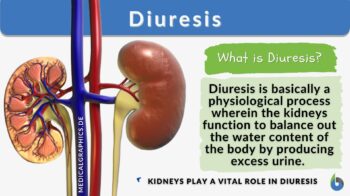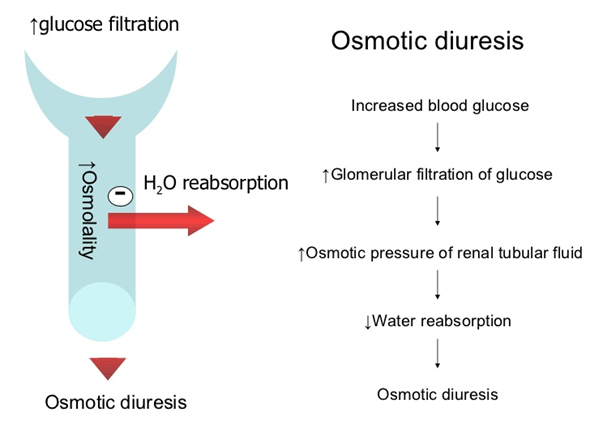
Diuresis
n., plural: diureses
[ˌdaɪjʊˈɹiːsɪs]
Definition: Excessive production of urine
Table of Contents
Diuresis Definition
In simple terms, excessively increased urination is referred to as diuresis. Diuresis is a collective term that refers to increased urine flow rate as well as increased urine flow/output. Diuresis may be spontaneous or in response to stimuli. Diuresis is basically a physiological process wherein the kidneys function to balance out the water content of the body by producing excess urine. The normal urine output is between 33 mL/h to 83 mL/h.
Accordingly, consumption of excessive fluid intake may induce mild diuresis to get rid of the excess water consumed. However, there are certain medications/drugs that can induce diuresis. Such medications promote the expulsion of water from the body as urine in order to balance the fluid overload or edema in the body. Cardiac diseases (like, high blood pressure, and heart failure) and kidney complications are some of the disease conditions wherein there is a fluid overload, i.e., excess fluid or edema in the body. Also, it is widely used to treat substance poisoning. Thus, in clinical practice, diuretics are considered to be critical care medicine used in a medical emergency.
Types
Diuresis may be induced in several conditions namely:
-
Osmotic diuresis
The increased urine output due to an increase in osmotic pressure in the proximal tubule of the kidney results in osmotic diuresis. Urine formation occurs in the kidney and along with water urine also has certain substances and electrolytes in it for eg., sodium ions, chloride ions, calcium, etc. Normal urine has negligible or small amounts of glucose in it.
In a disease state, if glucose enters the kidney tubule it is not reabsorbed and it increases the osmotic pressure in tubules. The increase in osmotic pressure inhibits or minimizes the reabsorption of water from the tubule increasing the urine output or diuresis. The same osmotic effect can also be exerted by mannitol. Hence mannitol is used as a diuretic agent to increase urine output in case of fluid overload in the body (Figure 1).

Certain substances present in the systemic circulation i.e. blood can also increase the osmolarity of the blood resulting in extracting excessive fluid from the interstitial space. This results in an increase in the water content of the blood which is eventually removed by the kidneys. This approach is used in hypotension wherein colloidal infusions are administered to increase the osmolarity of the blood thereby resulting in the removal of excess fluid from the body.
In osmotic diuresis, ions of sodium, chlorine, and potassium are generally excreted in the urine thereby causing dehydration. This is often seen in patients with diabetes mellitus. Polydipsia, i.e. excessive thirst is a classic symptom of diabetes which is caused due to excessive urine production or polyuria in such patients.
-
Rebound Diuresis
A sudden increase in urine output often occurs during the recovery of kidneys from an acute kidney injury. During an acute kidney injury, the kidney tubules get blocked by cellular debris. Once the blocked tubules get cleared, during recovery of renal function, there is an increase in urine output beyond the normal. The urine output may overshoot the normal daily range (i.e., 800 mL to 2L/ day).
-
Immersion diuresis
As the name suggests, diuresis induced by immersion of the body in a liquid/water is referred to as immersion diuresis. Primarily, two factors act here, pressure and temperature.
Due to immersion, the body is challenged by the lower temperature, which results in vasoconstriction of blood vessels, to preserve the body heat. Vasoconstriction results in elevated blood pressure which inhibits the release of the anti-diuretic hormone, vasopressin, thus increasing urine output. The hydrostatic pressure also increases the blood pressure, thereby increasing urine output.
-
Cold-induced diuresis
Exposure to cold temperatures results in hypothermia. Cold /low-temperature increase the urine output in a mechanism similar to the one explained above (effect of the low temperature of water). Briefly, low-temperature results in peripheral vasoconstriction, to conserve body heat.Vasoconstriction results in an increase in mean arterial blood pressure. Increased blood pressure signals the kidney to increase the urinary output resulting in diuresis.
-
Forced diuresis
Diuresis induced by diuretic drugs is known as forced diuresis. Diuretics are widely used in the treatment of heart diseases, to maintain the body’s fluid balance.
Diuretics are also used for the treatment of food/drug poisoning. Majority of the diuretic drugs are either weak acids or weak bases. Examples of alkaline diuretics include sodium bicarbonate while ascorbic acid and aluminium chloride are weakly acidic diuretics. Thus, accordingly, it can induce, forced alkaline diuresis or forced acidic diuresis. Weak acidic diuretics make urine acidic, thus eliminating alkaline drugs from the body, while weakly alkaline diuretics make urine alkaline and thus eliminating acidic drugs from the body. However, this (forced alkaline diuresis or forced acidic diuresis) method is only useful, when the drugs to be eliminated are acidic/basic in nature. This method can not be applied to drugs that are protein-bound (anti-depressant drugs) or drugs having a large volume of distribution (paracetamol) or are non-ionic.
Did you know..?
Diuretics are considered to be ‘banned substances’ in sports (during competition as well as out of competition) as they can help the athlete to lose weight rapidly to fit into a weight category of the sporting event and also it can mask the consumption of doping agents by rapidly clearing it from the body.
Watch this vid about diuresis:
Biology definition:
A diuresis is defined as excessive urination in order to get rid of fluid overload in the body and maintain fluid balance in the body. Diuresis may be induced by a drug (i.e., diuretics) or under certain medical conditions (like, heart failure, hypertension, diabetes, kidney stone), or even by low temperature and high altitude.
Synonym: polyuria
Causes Of Diuresis
Abnormally high urine output may be induced either by medications i.e., diuretics or water pills, or under certain medical conditions, as mentioned below.
- Diuretics. Diuretics are drugs that are used for the management of fluid overload in the body, usually under certain medical conditions like heart complications and kidney stones. Fluid overload is seen as edema in the body. This class of drug primarily works by inhibiting the reabsorption of sodium ions in the kidney tubules thereby increasing the osmolality in the kidney tubules. This elevated osmolality in renal tubules results in inhibition of water reabsorption thus increasing urine output. There are many types of diuretics, namely, Carbonic Anhydrase Inhibitors, Loop Diuretics, Thiazide Diuretics, Potassium-sparing Diuretics, Osmotic Diuretics, and Sodium-glucose cotransporter-2 (SGLT2) inhibitors.
- Diabetes. Impaired insulin production in diabetes leads to high blood sugar or high amount of plasma glucose levels. Eventually, glucose molecules reach the kidney for filtration, and therein they exhibit osmotic diuresis by inhibiting water reabsorption and thereby increasing urine output. Presence of mannitol in blood, as seen after consumption of alcohol. Alcohol contains natural sugar and mannitol. Mannitol also induces osmotic diuresis.Apart from diabetes type I and II, there is another medical condition known as diabetes insipidus, wherein the malfunctioning of the vasopressin hormone occurs which results in excessive kidney function and thereby urine output. Vasopressin may malfunction due to dysfunction in the hypothalamus or pituitary gland (this condition is known as central diabetes insipidus) Or, malfunctioning kidney due to blockage/ high amount of calcium/ low amount of potassium/ genetics/drugs (this is referred to as Nephrogenic diabetes insipidus) Or, pregnancy may result in a low amount of vasopressin (this is referred as Gestational diabetes insipidus) (Figure 2).

Figure 2: Diuresis in Diabetes Insipidus. Image Credit: Dr. Radhika A (Md) - Low temperature
- A high amount of calcium or hypercalcemia, as seen in cancer and disease of the parathyroid gland
- At high altitudes due to pressure difference
- A high amount of alcohol or caffeine and a protein-rich diet
- Urinary blockage
Symptoms Of The Condition
Apart from increased urination, the following symptoms are also frequently seen-
» Increased thirst as there is a higher amount of water loss from the body
» Along with water, urine also contains urine solutes like electrolytes. Thus, electrolytes loss also increases in diuresis, causing tiredness and fatigue
» Frequent urination also affects the quality of sleep
Diagnosing Diuresis
There are no specific diagnostic tests for diuresis. Symptomatic diagnosis is carried out by the medical practitioner. Also, to understand the underlying cause, diagnosis for associated disease based on symptoms may be carried out. Also, medical treatment is essential for the underlying disease-causing diuresis.
Complications That May Occur
Some of the complications of diuresis are discussed below.
-
Dehydration
Excessive urination results in excessive water and electrolyte loss from the body, leading to the possibility of dehydration. This may further lead to improper control over body temperature and also kidney dysfunction.
-
Hyponatremia
Excessive urination leads to loss of electrolytes from the body especially, sodium ions, and this condition is referred to as Hyponatremia. Sodium ions are very essential for the proper functioning of the heart, muscles, and nervous system. Sodium is vital for maintaining blood pressure. Hence, loss of excessive sodium ions can be fatal as well.
-
Hyperkalemia and hypokalemia
Potassium is an essential element for proper muscle function, heart function, and digestive system. However, higher or low amounts of potassium may affect health badly. A high amount of potassium in the body is referred to as hyperkalemia while a low amount of potassium in the body is referred to as hypokalemia.
Take the Diuresis – Biology Quiz!
References
- DISCUSSION: diuresis and diuretics. (1956). Proceedings of the Royal Society of Medicine, 49(9), 623–624.
- · Diuretics. (2021). In LiverTox: Clinical and Research Information on Drug-Induced Liver Injury. National Institute of Diabetes and Digestive and Kidney Diseases.
- · Roush, G. C., Kaur, R., & Ernst, M. E. (2014). Diuretics: a review and update. Journal of cardiovascular pharmacology and therapeutics, 19(1), 5–13. https://doi.org/10.1177/1074248413497257
- · Lang F. (1987). Osmotic diuresis. Renal physiology, 10(3-4), 160–173. https://doi.org/10.1159/000173127
©BiologyOnline.com. Content provided and moderated by Biology Online Editors.

